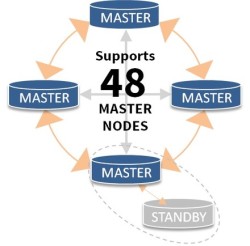Bi-Directional Replication or Asynchronous multi-master replication for PostgreSQL
As mentioned in my last post, I went to CHAR(14). There I learnt about Bi-Directional Replication (BDR). BDR is an asynchronous multi-master replication system for PostgreSQL, specifically designed to allow geographically distributed clusters. Supporting up to 48 nodes (and possibly more in future releases) BDR is a low overhead, low maintenance technology for distributed databases.
BDR is created by 2ndQuadrant and is the first of several replication technologies the company will announce this year to dramatically enhance PostgreSQL. Features of BDR have, and will continue to be moved into future releases of PostgreSQL. It is well-known that 2ndQuadrant develop code that all users of PostgreSQL can benefit from. The company has a long history of advancing the development of PostgreSQL, and specifically is accredited with making improvements to replication techniques.
2ndQuadrant’s CTO, Simon Riggs, commented: “BDR is a major enhancement to replication design and, with up to 48 master nodes supported, it offers a significant opportunity to reduce the overhead and headaches experienced with previous approaches to replication. For any organisation with distributed PostgreSQL databases replicated across multiple master nodes, BDR should be seriously considered.”
BDR is available as open source software, direct from 2ndQuadrant, with consultancy and support contracts available to ensure users can successfully design and implement a stable replicated environment. 2ndQuadrant’s Production Support service provides direct help from the development team behind BDR.
The company has been working with a number of early adopter clients, including BullionByPost®, and a leading antivirus software developer, to fine tune and evaluate BDR in demanding environments, ahead of this announcement.
I forgot to say that BDR, an extension to PostgreSQL, is free and open source; licensed under the same terms as PostgreSQL. PostgreSQL is released under the PostgreSQL License, a liberal Open Source license, similar to the BSD or MIT licenses.
You can get a lot more information on the website –
- Performance
- Start-up Guide
- BDR Documentation
- A chart comparing BDR to trigger-based replication solutions
There you can also describe your replication requirements or sign up for the quarterly Newsletter.


Leave a Reply